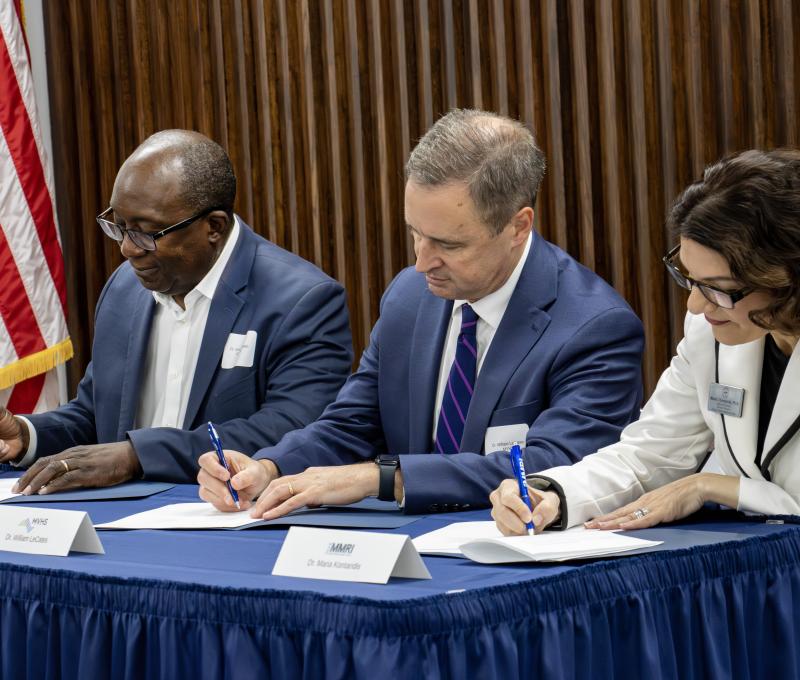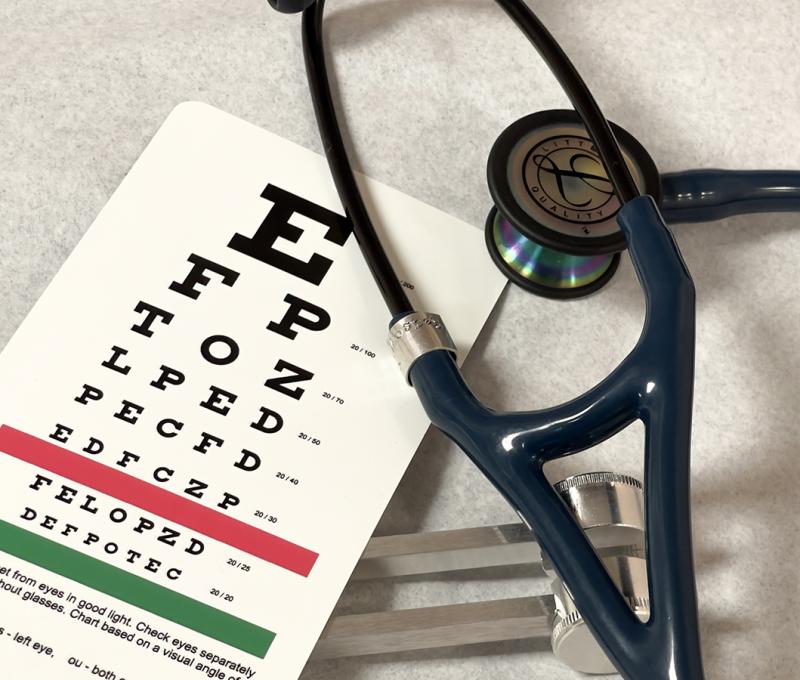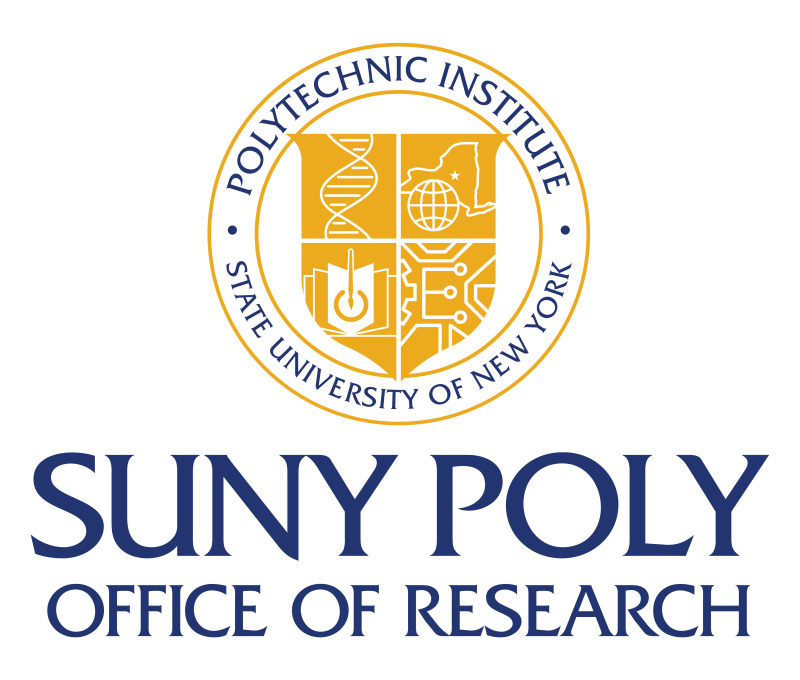News Release: SUNY Poly Professors Awarded $1.25 Million by NYS Center for Advanced Technology in Nanomaterials and Nanoelectronics Investment Program

Matching Investment Program (MIP) leverages $375K Empire State Development/NYSTAR Funding to SUNY Poly’s CATN2 to Enable $875K in Matching Commitments from Industry Partners
ALBANY, NY – SUNY Polytechnic Institute (SUNY Poly) announced that five faculty-led research projects in areas ranging from semiconductors to nanobiotechnology and energy will receive a total of $1.25 million in funding from five companies with operations in New York State, and as part of the inaugural New York State Center for Advanced Technology in Nanomaterials and Nanoelectronics (CATN2) Matching Investment Program (MIP) to further leading-edge faculty research through these critical industry partnerships.
“On behalf of SUNY Poly, I offer my congratulations to each faculty research team to receive funding through this important CATN2 MIP program, which is catalyzing critical research that can pave the way for more advanced computing technologies, improved energy storage capabilities, and biotechnology-focused applications,” said SUNY Poly Interim President Dr. Grace Wang. “These awards highlight the incredible talent of SUNY Poly’s faculty and research teams, in addition to the opportunities that a SUNY Poly education can provide, with two SUNY Poly spinoff companies led by alumni taking part in the exciting research opportunities enabled by this impactful funding.”
The CATN2 completed the first-round competition of fiscal year 2018-2019 for funding under the CATN2 MIP to catalyze faculty/staff-led projects that can lead to commercial success in collaboration with a NYS company by leveraging and expanding SUNY Poly’s research, development and deployment capabilities. Awards under the first round totaled $375,000, with commitments of resources from industry partners totaling an additional $875,000 for total project investments of $1,250,000. The MIP funding originates from a portion of a $900,000 grant from Empire State Development’s Division of Science, Technology, and Innovation (NYSTAR) to support SUNY Poly’s CATN2’s operations.
NYSTAR Executive Director Matt Watson said, “These faculty-led projects embody the collective goal of our Centers for Advanced Technology across the state by utilizing public-private collaborations to develop and advance new technologies that encourage economic growth.”
“Notably, a number of SUNY Poly undergraduate and graduate students will be supported by these projects so that they will be able to obtain hands-on educational experiences, providing a great example of why SUNY Poly’s strategic and focused high-tech education can be so important for setting our students on a successful pathway as we congratulate our faculty and research teams on the successful funding of these fascinating research efforts,” said Interim Provost Steve Schneider. “In addition, we are proud that SUNY Poly spinoff Glauconix, which is based at our SUNY Poly Albany campus and led by an alumna, will be able to further their exciting drug screening research, as well as SUNY Poly spinoff Eonix Energy, which is led by two SUNY Poly alumni whose work began in the SUNY Poly lab while they were students. These are all a powerful testament to SUNY Poly’s innovative educational ecosystem.”
“Funding of these research teams further increases our ability to continue to be impactful toward our educational mission of developing the next generation of highly skilled scientists and engineers in nanotechnology fields, as it is CAT’s mission, as well as enabling further public-private research collaborations, that will enhance SUNY Poly’s standing as an economic engine in New York,” said SUNY Poly Interim Vice President of Research Advancement and Graduate Studies Dr. Shadi Shahedipour-Sandvik.
“I congratulate all of the researchers whose projects were selected for a MIP award. These grants showcase the incredible talent of SUNY Poly’s faculty and alumni who are tackling today’s technological challenges in a wide range of areas, and, combined with SUNY Poly’s high-tech partners and the institution’s world-class facilities and resources, we are proud to help enable New York State-based research that can be meaningful to our society,” said Michael Fancher, Director of the New York State CATN2 and principal investigator for cyber physical systems, clean energy projects, entrepreneurial programs.
The CATN2 MIP awards, including primary investigators, total amount of award with industry match, and summary of the research to be undertaken as part of the 2018–2019 Round 1 grants include:
Project Title (capability): Hot Embossing System for Polymeric Processing
PI: Nate Cady (with Greg Denbeaux, Natalya Tokranova)
Budget: $316,857
Summary: This project is establishing a robust polymeric hot embossing process capability (using high-precision silicon-based molds). This capability improvement is being enabled by the donation of a Calvary Automation hot embossing system from industry partner Ortho Clinical Diagnostics. This project will include microfluidic component production to support the pursuit of low-cost, Si-photonic biosensors, and the integration of metallic contacts and interconnects onto polymeric substrates for interposer/packaging applications.
Impact: The donation of the hot embossing systems will augment SUNY Poly’s packaging abilities allowing for the development of a process for production of microfluidic components that would be compatible with the photonics integrated circuit (PIC) chips of AIM Photonics. Efforts will expand SUNY Poly’s polymer processing capabilities, aiming to attract additional utilization of the 200mm fabrication facilities.
Dr. Cady said, “The MIP award will expand the CATN2’s pilot manufacturing capabilities for microfluidic components used in biosensor devices and be compatible with photonic integrated circuit (PIC) chips developed by AIM Photonics.”
Project Title (capability): Rapid Cell Analyzer for Drug and Gene Screening
PI: Yubing Xie (with Susan Sharfstein)
Budget: $312,611
Summary: This project will further develop stem cell-based artificial outflow systems for drug and gene screening in support of Glauconix which include developing a stem cell-derived artificial conventional outflow system (ACOS) and develop an ACOS model for drug screening.
Impact: This project will strengthen the relationship with Glauconix, a rapidly growing SUNY Poly launched start-up. One of the desired results of this project would be the generation of relevant data that would make the award of additional federal funds more likely.
Dr. Xie said, “The MIP award expands shared-use capabilities that will support faculty research and train students while supporting one of the CATN2’s fastest growing start-up companies by accelerating new drug development using Glauconix’s patented technology.”
Project Title (capability): Expanded Electron Simulation and Test Method Capabilities to Support EUV Lithography
PI: Greg Denbeaux (with Robert Brainard)
Budget: $104,859
Summary: This project will expand SUNY Poly’s low-energy electron simulation capability to the entire periodic table, and use that to predict the secondary electron emission from underlayer materials for EUV lithography. This specific effort would be to develop and optimize the testing methods to measure secondary electron emission effects in EUV resists using our existing vacuum chambers, electron guns and EUV source. This project, in collaboration with LAM Research, will improve SUNY Poly’s capability to measure the effect of EUV underlayers on the resist response, and would likely attract additional outside research funding.
Impact: The newly developed testing methods would become a resource for NYS companies and establish a unique capability for EUV lithography serving advanced semiconductor industry supply chain and end-use manufacturers.
Dr. Denbeaux said, “The MIP award will support one of the original equipment manufacturers located on the Albany campus by establishing a materials screening simulation capability for advanced semiconductor patterning technology that is important to LAM Research.”
Project Title (capability): Energy Storage Pilot Prototyping and Testing Lab
PI: Harry Efstathiadis (with Hassa Bakru, Seiichiro Higashiya, Iulian Gherasiou)
Project Title (capability): Energy Storage Pilot Prototyping and Testing Lab
Budget: $197,991
Summary: This project will provide equipment purchases and updates in support of pilot prototyping and testing capabilities for two energy storage electrochemical systems, Li-ion batteries (LIB) and Electric Double Layer Capacitors (EDLC) (next gen replacement of LIB in EV). Existing partners in this project and lab users are Eonix and IBM. The projects will focus on materials and processing techniques to produce high quality lithium ion batteries and electrochemical double layer capacitors leading to improvements for electric vehicles and deep neural networks.
Impact: This project aligns well with the SUNY Poly and NYS strategic areas and will: (1) establish a sustainable operating model for the energy storage lab; (2) expand the applied research capabilities, and build a prototype lab and test-bed facility for electro chemical cells; (3) perform R&D on electrochemical devices; and (4) use lab for workforce training aligning with the NYS 2018 clean energy industry report.
Dr. Efstathiadis said, “The MIP award will benefit faculty research and train students while supporting Eonix, one of the CATN2’s successful clean energy start-up companies, by establishing an electrochemical prototype lab and test-bed capability for energy storage (batteries and capacitors) and generation (fuel cells).”
Project Title (capability): High Voltage Testing Center for Wide Bandgap Power Devices
PI: Woongje Sung
Budget: $300,000
Summary: Through the purchase and installation of a 20kV probe station and a parametric analyzer, this project will establish a much needed high voltage testing center (HVTC) that will not only support SUNY Poly research projects, but also other industrial partners including Syracuse, NY, based NexGen Power Systems Inc.
Impact: The HVTC will not only support NexGen, but will also become a revenue generating center by providing testing services to New York’s universities and industry by expanding the voltage range for testing; this project will also improve SUNY Poly’s ability to win grant awards.
Dr. Sung said, “The MIP award will accelerate the development and market adoption of power electronic devices using wide band gap materials by establishing a high voltage testing capability for products developed by NexGen in Syracuse, among others, seeking to address growing demand in micro-grid, smart building, electric vehicle, and other applications.”
####################
About SUNY Polytechnic Institute (SUNY Poly)
SUNY Poly is New York’s globally recognized, high-tech educational ecosystem. SUNY Poly offers undergraduate and graduate degrees in the emerging disciplines of nanoscience and nanoengineering, as well as cutting-edge nanobioscience and nanoeconomics programs at its Albany campus, and undergraduate and graduate degrees in technology, including engineering, cybersecurity, computer science, and the engineering technologies; professional studies, including business, communication, and nursing; and arts and sciences, including natural sciences, mathematics, humanities, and social sciences at its Utica/Rome campus; thriving athletic, recreational, and cultural programs, events, and activities complement the campus experience. As the world’s most advanced, university-driven research enterprise, SUNY Poly boasts billions of dollars in high-tech investments and hundreds of corporate partners since its inception. For information visit www.sunypoly.edu.
About Center for Advanced Technology in Nanomaterials and Nanoelectronics (CATN2)
The mission of the New York State Center for Advanced Technology in Nanomaterials and Nanoelectronics (CATN2) at SUNY Polytechnic Institute (SUNY Poly) and its College of Nanoscale Science and Engineering (CNSE) is to drive systematic progression in technology transitions, market adoption, skills attainment and entrepreneurial growth by aligning SUNY Poly’s Applied Research Capabilities (SPARC) with industry cooperation partners through each phase in the research, development, & deployment (RD&D) commercialization continuum.
About NYSTAR
Empire State Development's Division of Science, Technology and Innovation (NYSTAR) advances technology innovation and commercialization in New York State. Its 70+ funded centers provide direct assistance to companies from start-up through maturity, leveraging the state’s unparalleled investment in world-class technology assets and expertise.








